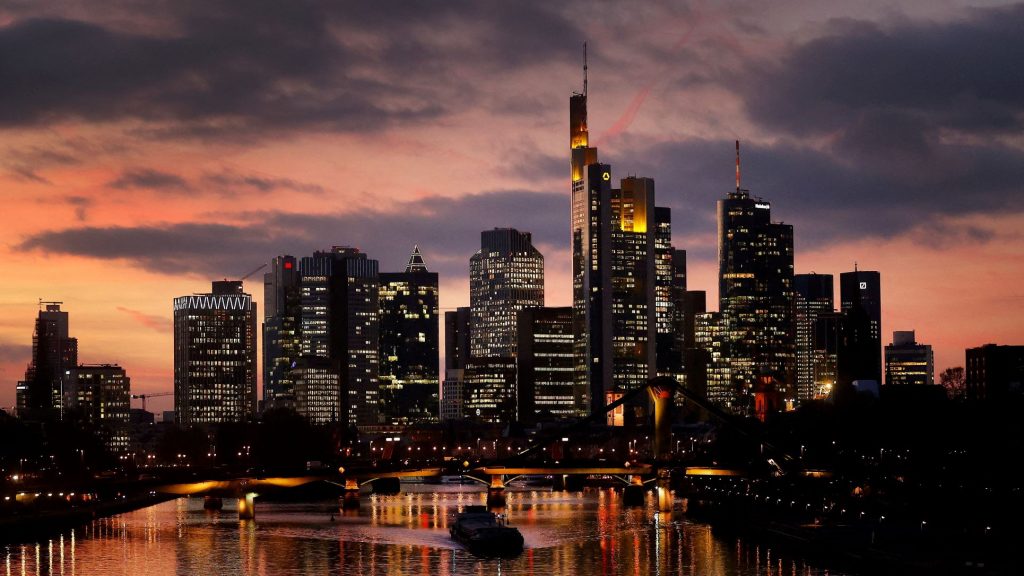Sky No Longer The Limit For Germany’s ‘Mainhattan’ Skyscraper Boom

Towering above a nondescript office quarter of downtown Frankfurt, a 47th floor three-bedroom apartment is on sale for 9 million euros ($10 million), a lofty price some see as a warning.
Dubbed “Mainhattan” by locals in a nod to its skyscrapers and location on the Main river, Germany’s financial hub may be a far cry from New York in terms of nightlife, culture and banking but it did beat it to top a 2021 real estate bubble index.
Having long shunned property ownership, rock-bottom borrowing costs, rising rents and for some the impact of having to pay to keep their money in the bank have persuaded almost one in two Germans to buy a house or apartment.
The ensuing property rush is seeing 18 high-rise buildings spring up across Frankfurt, a building frenzy replicated across Germany, where prices have hit record highs, with the cost of houses up roughly 50% since mid-2016.
Frankfurt beat Hong Kong, Toronto and New York in the 2021 UBS ‘bubble’ ranking, with nearby Munich also near the top.
And since the middle of 2019, German real estate price rises have outstripped much of the rest of Europe, including France and Britain, and during the second quarter of 2021 house prices jumped more than 10% compared to a year earlier.
The demand has been highlighted by moves such as German insurer Allianz and a local pension fund this year paying 1.4 billion euros ($1.6 billion) for one of a development of four new skyscrapers planned for the financial capital.
The project, known as FOUR, includes offices as well as two bedroom apartments with a price tag of around 3 million euros.
“We are targeting the Frankfurt area,” the developers behind the project said. The city is one of the wealthiest in Germany. “The demand has confirmed this was the right approach. We don’t see a bubble.”
While there has been a steady build-up of interest, coronavirus has turbo-charged property investment as Germany’s traditional savers have had even more money to put aside and deposits have been hit by negative interest rates.
Less than 42% of Germans owned their own home in 2006, but that climbed during the financial crisis to almost 47% in 2018.
Borrowing to buy property has picked up speed during the pandemic, according to the latest data from Germany’s Bundesbank. Home loans reached 1.45 trillion euros at the end of 2020, roughly 6% higher than a year earlier and data for this year show this borrowing has continued to grow.
‘SKY NOT THE LIMIT’
As the ongoing pandemic curbs immigration and bolsters tenant protection, while Germany’s ageing population shrinks ever faster, some observers say the seeds have been sown for property prices to unwind.
The Bundesbank warned in November of the risks of an overheated property market, cautioning that it could be overvalued by as much as 30%.
“We need immigration of roughly 220,000 just to keep the population, and demand for property, stable. But immigration has taken a hit from Corona,” Jochen Moebert, an economist with Deutsche Bank Research, said, adding that net immigration fell from up to 400,000 before the pandemic to 220,000 last year.
Moebert forecasts that this, coupled with stricter rules to make homes energy efficient and rent controls mean the property market could turn in 2024.
“We’re reaching the top,” he said.
Barbara Steenbergen of the International Union of Tenants said that the pandemic had tightened controls on European property investors by restricting foreign buyers from snapping up ordinary homes in Amsterdam and elsewhere.
“The markets for investors are becoming more regulated across Europe,” she said.
In Frankfurt, there are the first signs of a turn, with plans for a Porsche-branded designer apartment tower dropped.
And local officials agree the top may have been reached.
“The sky is not the limit for property prices,” a spokesman for Frankfurt’s planning department told Reuters.
“For luxury apartments, what we have is enough.”
(Reporting by John O’Donnell; Editing by Alexander Smith)




